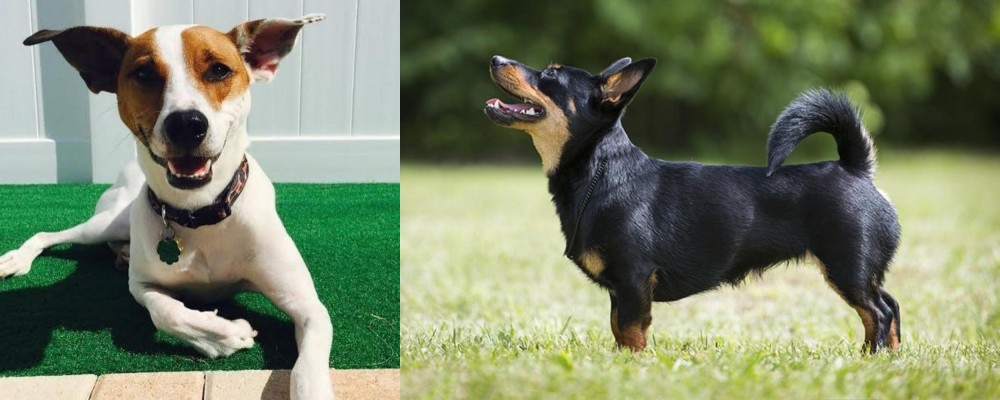 Petzlover
Petzlover Feist is originated from United States but Lancashire Heeler is originated from United Kingdom. Feist may grow 25 cm / 10 inches higher than Lancashire Heeler. Feist may weigh 9 kg / 20 pounds more than Lancashire Heeler. Feist may live 4 years more than Lancashire Heeler. Both Feist and Lancashire Heeler has almost same litter size. Both Feist and Lancashire Heeler requires Low Maintenance.
Feist is originated from United States but Lancashire Heeler is originated from United Kingdom. Feist may grow 25 cm / 10 inches higher than Lancashire Heeler. Feist may weigh 9 kg / 20 pounds more than Lancashire Heeler. Feist may live 4 years more than Lancashire Heeler. Both Feist and Lancashire Heeler has almost same litter size. Both Feist and Lancashire Heeler requires Low Maintenance.
 The Feist is a small dog from the United States, coming from Terrier dogs which were brought over to the States. It is believed that these Terriers included crosses between several terriers – the Manchester Terriers, Smooth Fox Terrier and English White Terrier – dogs used as ratters and known for their skills in killing rats.
The Feist is a small dog from the United States, coming from Terrier dogs which were brought over to the States. It is believed that these Terriers included crosses between several terriers – the Manchester Terriers, Smooth Fox Terrier and English White Terrier – dogs used as ratters and known for their skills in killing rats.
The Feist isn’t a new type of dog and in fact there are records of the dog which go back centuries. George Washington even referred to them in 1770 already, and the breed was popularized by President Teddy Roosevelt, who hunted with his Feist.
 The Lancashire Heeler, known also as the Ormskirk Heeler or Ormskirk Terrier, hails from England and is looked upon as a vulnerable breed by the Kennel Club in the 21st century.
The Lancashire Heeler, known also as the Ormskirk Heeler or Ormskirk Terrier, hails from England and is looked upon as a vulnerable breed by the Kennel Club in the 21st century.
He was developed to be a cattle drover, but is essentially a companion dog today. Exact details of the origin of the Lancashire are unknown, but it is generally accepted that Welsh Corgis were used as well as a kind of black and tan terrier known as the Manchester Terrier.
In England, he has been known as a general working dog for more than a century.Gwen Mackintosh began breeding these dogs in the 1960s and the Lancashire Heeler Club was established in 1978. The dog was also placed on the Endangered Breeds in 2003.
 Standing at about 46cm to 56cm in height and weighing in the region of 10 to 15kg, the Feist is a short haired dog that doesn’t shed much and he is not hypoallergenic.
Standing at about 46cm to 56cm in height and weighing in the region of 10 to 15kg, the Feist is a short haired dog that doesn’t shed much and he is not hypoallergenic.
The coat of the dog is available in a variety of colors but they are essentially a bi-colored dog such as red and white, tan and white, black and white, while solid colors are fawn, white, light brown, black and brindle too.
Perhaps because of so many genes being involved with this dog, it is more easily identified because of its hunting abilities. He is a sturdy dog with a medium length tail which he holds up. Some Feist owners prefer the look of a docked tail and then docking is between the second and third joint of the tail. The Feist has erect or semi-erect ears.
Intelligent and alert, the Feist is a dog that will respond well to training. As with any other dog, training and socialization will be important for him so that he is obedient. He is energetic, curious and alert and above all he wants the attention of his human family.
 As a small breed dog, the Lancashire Heeler stands at 25 – 31cm in height, both male and female, and the dog weighs in the region of 2 to 6kg.
As a small breed dog, the Lancashire Heeler stands at 25 – 31cm in height, both male and female, and the dog weighs in the region of 2 to 6kg.
Looking quite similar to a Corgi or a German Shepherd with short legs, the Heeler’s legs are meant to be fairly straight and not bandy-legged. He has a short, weather-proof coarse coat that can be black or liver-colored, with tan markings. The coat is regarded as low maintenance. The hair is slightly longer around his neck.
The ears are erect, the eyes brown and bright and the tail these days is left long with a slight curl.
Intelligent, stubborn, strong willed, playful and friendly, the Lancashire Heeler is capable of making you an excellent pet and companion.
This dog is smart and learns quickly. He is energetic and playful, strong and robust and more than willing to take part in all the activities that you’re taking part in.
With training and socialization he makes a splendid pet, but he doesn’t put up well to abuse and disrespect from younger children. He is willing to get along with other pets in the home too.
 Loving to be around his human family and being a devoted and loyal canine friend, the Feist is also an intelligent, energetic dog who is fairly easy to train.
Loving to be around his human family and being a devoted and loyal canine friend, the Feist is also an intelligent, energetic dog who is fairly easy to train.
Bright and alert he makes a good watchdog too, but is amicable enough to get on well with other pets in the home as well as with children.
He can be stubborn so training and socialization will be important for him. As it is, he likes a firm, strong owner and in exchange for good care, he will become your devoted, loyal friend.
 As with any dog breed, there are wide variations in temperament. A dog essentially turns out the way it was brought up, similar to a child. Angry, harsh, aggressive, uncaring dog owners produce a dog that is both timid and aggressive, unsure, frustrated and with behavioral problems.
As with any dog breed, there are wide variations in temperament. A dog essentially turns out the way it was brought up, similar to a child. Angry, harsh, aggressive, uncaring dog owners produce a dog that is both timid and aggressive, unsure, frustrated and with behavioral problems.
Make your dog part of your family, provide him with good food, exercise and love and he will make an awesome pet.
The Lancashire Heeler is such an amicable, social dog at heart, and treated well, he will turn out like is inherent characteristics. He is an outgoing, friendly dog, more so when he has been trained and socialized. He will adapt to city- or country life, so long as he is exercised each day.
The Heeler has a good, balanced temperament, and counted in as a loved family member, you’ll make sure he stays that way.
 A Feist is a robust dog who doesn’t have any particular health issues, and with good care he can reach 18 years of age if looked after well. Hip Dysplasia is such a common dog illness that it always bears mentioning.
A Feist is a robust dog who doesn’t have any particular health issues, and with good care he can reach 18 years of age if looked after well. Hip Dysplasia is such a common dog illness that it always bears mentioning.
This is a ball and socket joint problem where the joint doesn’t function smoothly and the grinding of the bone leads to pain and arthritis for your pet. You'll notice he battles to play games anymore and he also battles to get up after lying down. You need to know that this disease isn’t reserved for old dogs but can start while your dog is still a puppy and that it can lead to lameness.
Look out for allergies in your dog as they can cause a host of problems which can include his skin, his breathing and problems with digestion. Typical symptoms of a dog with allergies include sneezing,scratching and very distressing for a dog, itchy and red skin which can eventually ooze.
As a responsible dog owner it is imperative when you detect problems with your dog, to get him to the vet immediately.
 Your Heeler can live to be 14, 15 or 16 years of age and live even longer than this with the right care. He is such a healthy breed, but one of the common dog illnesses to look out for are eye diseases.
Your Heeler can live to be 14, 15 or 16 years of age and live even longer than this with the right care. He is such a healthy breed, but one of the common dog illnesses to look out for are eye diseases.
This is where the ligaments of the eye are weakened so that the lens actually loosened and then displaced, causing pain for the dog. This displacement can obstruct fluid drainage from the eye too and your vet may need to perform surgery.
The shock-absorbing intervertebral discs can have spinal compression and contribute to significant pain for your pet. Early signs will see your Lancashire Heeler being reluctant to jump on his chair like he may once have done. Preventing obesity is important for reducing pressure on the dog’s spine.
 Grooming your Feist dog isn’t going to be costly or difficult at all, as with his short, smooth coat he will essentially only require a brush twice a week.
Grooming your Feist dog isn’t going to be costly or difficult at all, as with his short, smooth coat he will essentially only require a brush twice a week.
It’s good to get into the habit of brushing him as not only does it keep his coat sleek and shiny, he loves you paying him attention.
All dog owners need to know that grooming goes beyond just brushing the coat. You want to also check his nails that they are short, check in and around his ears and brush his teeth with special dog toothpaste and toothbrush.
Give your Feist the very best dog food there is. Home-made is always good but if you feed him commercially manufactured food, make sure its a quality one. Some raw meat added in every now and again is important for his health. Ensure fresh, cool water is available to him around the clock.
Your Feist is an energetic dog that has been accustomed to hunting and running down small prey. He is an outdoor dog, thriving on fun and games. Take him on your walks, your hikes or when you go cycling or swimming. He wants to be right there with you involved in everything. While he can slot into life in the city or the countryside, he isn’t an indoor dog and it certainly won’t be good for him if you keep him cooped up in a tiny garden and pretty much forget about him.
 Known as a low maintenance dog, the Lancashire Heeler’s short coat will require little grooming, just a good brush twice a week.
Known as a low maintenance dog, the Lancashire Heeler’s short coat will require little grooming, just a good brush twice a week.
If your Heeler doesn’t wear his nails down naturally, they will need to be clipped as part of the grooming process. Ears should also be checked regularly. Excess wax and dirt can build up which can lead to an ear infection. This can drive your dog mad with frustration. Teeth also need to be brushed regularly.
Remember, if you feel guilty for not getting to grooming your pet, there are professional groomers at your local vet or who work independently and they will do all of this for you.
Your Lancashire Heeler is such a social, active little dog who is always willing to be counted in to all your fun and games. If you’re lucky to have a fair sized garden, involve him in some ball games, or use a rope for him to tug on while you pull the other side. Whenever you go for a walk, he will be thrilled to join you as he loves picking up all those new scents outside his garden.
Nutritious food is important for longevity and health in a dog. Every dog has different dietary needs throughout their lives – when they’re puppies, when the female is pregnant, after they’ve been spayed or neutered, as a working dog, when they’re sick, when they’re old and so on.
There are some good dog brand foods to use, but you want to choose the best ones to ensure your dog gets all the vitamins and minerals needed as opposed to those that are packed with colorants, preservatives and fillers.
Home-made food is important too and some cooked chicken, cooked rice and raw or cooked vegetables can be added to his dry kibble from time to time. Don’t complicate your dog’s diet – just feed him plain, wholesome food like this with a little bit of raw meat added in occasionally. Simple, nutritious food will ensure he is energetic, bright eyed and happy. Make sure he always has fresh, cool water.